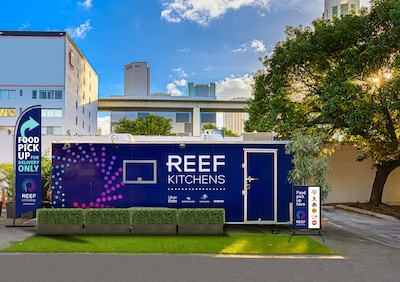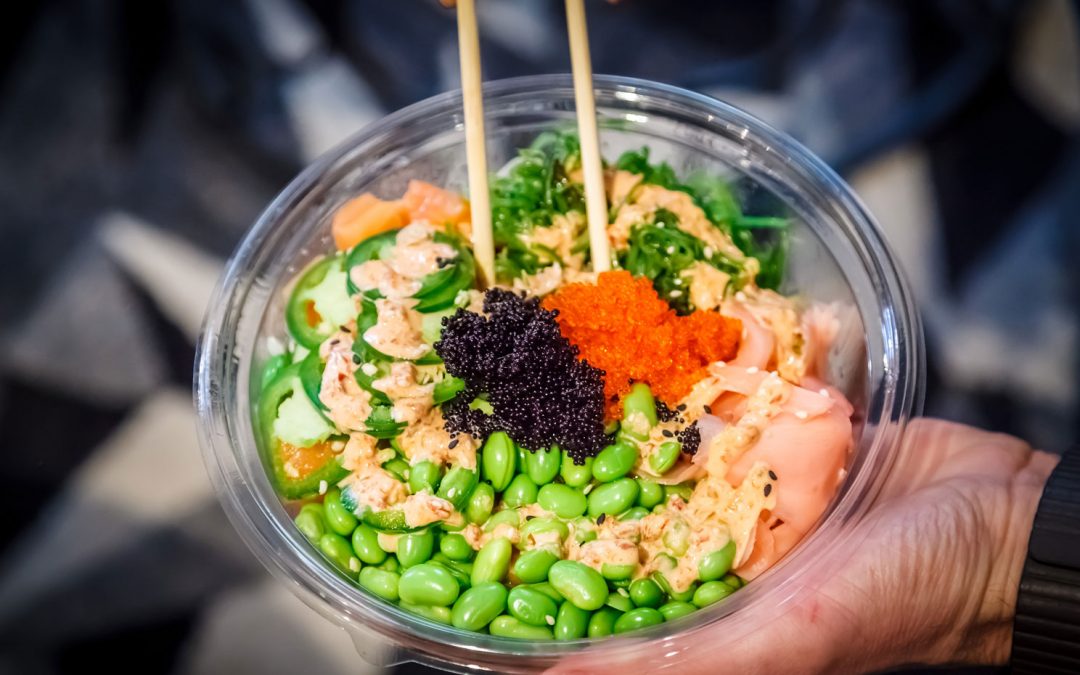The folks behind Aloha Poke, a Hawaiian-themed poke restaurant based in Chicago, see ghost kitchens as a way to seed new markets. CEO Chris Birkinshaw said it’s a natural fit for the restaurant, which has a relatively simple model and does a lot of off-premises already. He said the explosion of ghost options meant he could test his theory of seeding markets with low-overhead outlets.
“I’ve always been fascinated by the idea to use a ghost kitchen to enter a marketplace in advance of going in and building brick and mortar. The fact that we were already a majority takeaway and delivery (company) lends itself really well to that,” said Birkinshaw.
He partnered with Reef Kitchens, a ghost-kitchen operator that places modular kitchens in urban parking facilities. The company owns and operates about 5,000 parking facilities and essentially drops a shipping container across a few spaces and cooks food inside.
Reef COO Carl Segal said the company is on track to have 1,000 such kitchens open in the next five years, although growth is just getting started in key metropolitan statistical areas, or MSAs.
“We have just over 100 now. We’re in about 20—soon to be 22—MSAs; think about all the major cities in the U.S. and Canada,” said Segal. “We can operate up to six to eight different brands per vessel, of course depending on the complexity.”
After hitting the major markets, Reef will be looking toward secondary markets: Places like Naperville outside of Chicago—it’s 45 minutes from the urban core, but bustling with corporate centers, universities and dense residential.
Birkinshaw said the arrangement made sense because he didn’t actually have to operate the ghost facilities, whether they were in new markets or on the other side of a metro. He sees that as bringing incremental sales into the company without additional overhead and oversight of more conventional locations.
“They operate under a franchise license agreement. The other guys are more traditional real estate developers with shared kitchens, but I still have to hire a half dozen people and support them with someone on an airplane. It just didn’t make sense to us,” said Birkinshaw.
Reef Kitchen’s competitors require the brand to handle operations, which Birkinshaw, says makes sense for concepts trying to get across town and extend delivery or pickup, but not for his setup.
At first blush, the partnership sounds like other licensing operations such as Aramark or Sodexo in places like college campuses and airports, but Segal said Reef thinks about the partnership through a different lens.
“We’re really helping these brands reach their own individual goals. We work very closely with them in that, a contract feeder like that is basically buying the brand name and working on the strategy. Those companies are limited to large concession operations, stadiums, schools. We’re talking about a direct-to-their-customer program, just as if they had a location in that area. That line to the customer is there,” said Segal.
The potential for opening up low-cost outlets works in current markets to develop scale and coverage or to expand to new markets, relying on Reef employees without brand oversight in the market.
“They can come to us and say ‘we’re operating three locations in this town, but there are three or four areas where we don’t have coverage.’ That’s one really great way to expand with us,” said Segal. “The other, when a brand wants to try a different target area and they want to test it and make sure it’s going to work, that’s an example like Aloha. It’s a Chicago-based company with locations in a number of markets. But if they wanted to try L.A., instead of going out and opening a brick and mortar, they can use their powerful social-media machine to create buzz in L.A. and we can help them open.”
He said he especially likes working with franchise businesses because all of the materials are already there. He’s currently working with BurgerFi and Nathan’s Famous.
“The thing that’s amazing with working with franchise operations is that they have so many of the tools already built out, recipes, SOPs, training materials—those types of things really help us to get the brand up and running quickly,” said Segal.

The Aloha Poke training was just getting started, but Birkinshaw said it should be a quick process to get the initial Reef location open in Miami. He said he’s also excited that once training is done, the company can push out other locations without much, if any, involvement from the brand, aside from pointing out where the company wants to go.
“We’re able to share that institutional knowledge of the brand. Once our team knows Aloha Poke and they’re set up in our supply chain, we’re able to get our own internal teams trained on a national level and we can bring new locations to life very quickly,” said Segal.
Sales and marketing will be key things to watch for both Aloha and Reef. Segal said both areas are split between partners. It’s a revenue-sharing model on the sales side and a “dollar-for-dollar” shared marketing plan between the brand and Reef.



